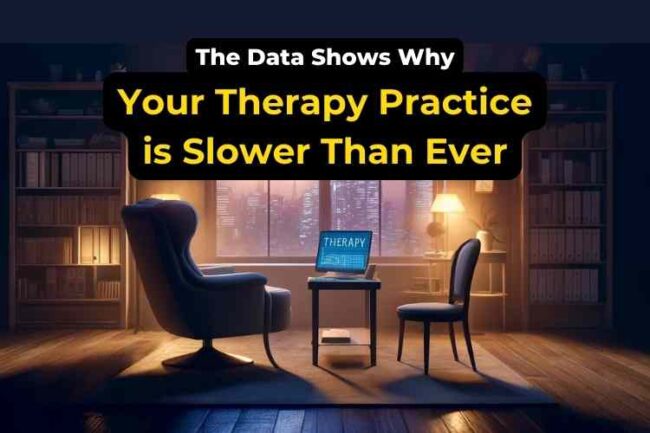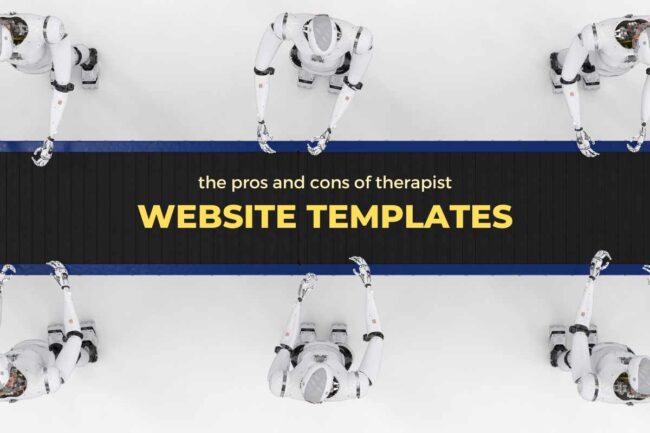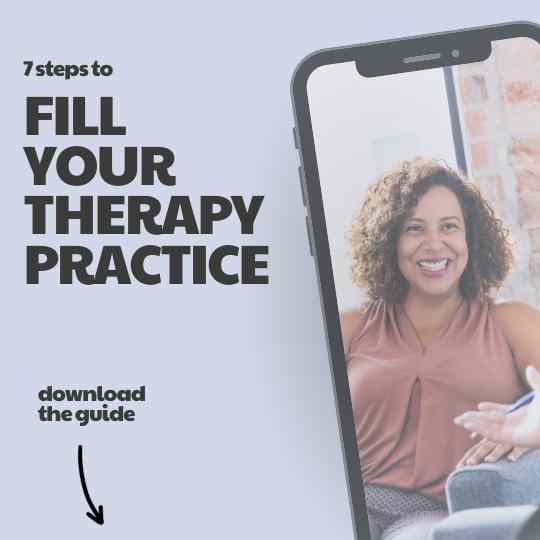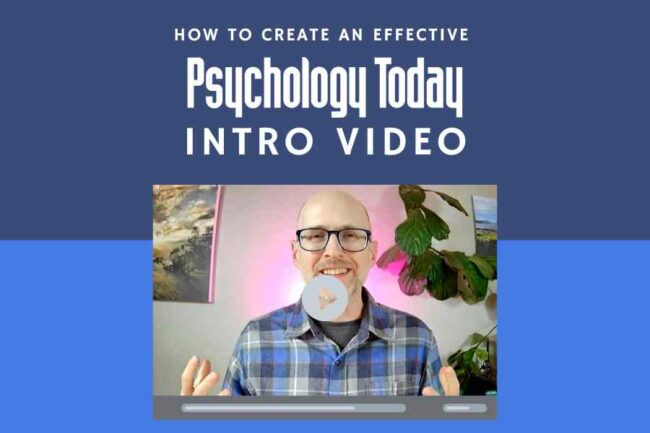Effective SEO for therapists is indispensable for therapists aiming to expand their client base and enhance their online visibility in 2024. As you navigate the digital landscape, understanding and implementing a robust SEO strategy can significantly contribute to positioning your practice on page 1 of Google. By optimizing your website, you increase the likelihood that potential clients will find your therapy services when they need them the most.
Embarking on the journey of SEO for therapists requires familiarity with several key concepts. Beginning with understanding the fundamentals of SEO, you can move on to exploring keyword research and strategic content creation tailored to the needs of your target audience. It’s essential for your content to resonate with prospective clients while also adhering to SEO best practices to achieve the desired reach and impact.

Understanding SEO Fundamentals
SEO, or search engine optimization, is crucial for increasing the visibility of your therapist practice online. By understanding how search engines work and optimizing for their algorithms, you can elevate your website’s rank and draw in more potential clients.
What is SEO?
SEO is the practice of optimizing your website to improve its visibility when people search for services or products related to your therapy practice in Google and other search engines. The better visibility your pages have in search results, the more likely you are to garner attention and attract prospective and existing patients to your business.
How Search Engines Work
Search engines like Google use complex algorithms to retrieve data from their search index and instantly deliver the best possible results for a query. The search engine processes and ranks pages based on relevancy and authority, ensuring that users get the most helpful and accurate information tailored to their search.
The 3 Pillars of SEO (Keywords, Technical, and Backlinks)
- Keywords: These are terms that potential clients use when looking for therapy services. They should be strategically placed in your content to align with what your target audience is searching for.
- Technical: This refers to non-content elements of your website. It’s crucial for your site to have a strong structure, fast load times, and be mobile-friendly, so search engines can crawl and index your pages efficiently.
- Backlinks: These are links from other therapist websites that point to your site. High-quality backlinks can significantly boost your site’s trustworthiness and authority.
How to Get on Page 1 For Popular Terms in Competitive Geographic Markets
To rank on page one in competitive markets:
- Utilize local SEO strategies, targeting keywords specific to your geographic location.
- Ensure your website is listed and optimized in local directories and on map listings, especially Google My Business.
- Collect positive reviews from past clients to bolster your online reputation and authority.
By focusing on these fundamental aspects of SEO, you’ll be on the right track to improving your therapy practice’s online presence and appearing in front of the clients who need your services.

SEO For Therapists Keyword Research and Strategy
Before diving into the specific tactics of SEO for therapists, it’s crucial to understand that your success hinges on identifying the right keywords. These terms are the foundation of your online visibility and will guide your content creation efforts.
Identifying Relevant Keywords
The first step in your SEO journey is to identify relevant keywords that your potential clients are using to find services like yours. Use tools like Google’s Keyword Planner or SEMrush to uncover terms with significant search volume. Don’t just look for any keywords; be strategic and find ones specific to therapy and counseling that can drive targeted traffic to your site.
An Overview of User Intent
Understanding user intent is key to choosing keywords that will not only draw traffic but also attract clients. There are typically four types of user intent: informational, navigational, transactional, and commercial investigation. Ensure your chosen keywords align with what your potential clients are looking for, whether they need information on therapy types or are ready to book a session.
Apps for SEO Keyword Research
Leverage apps designed specifically for SEO keyword research to streamline the process. Platforms such as Ahrefs or Moz Keyword Explorer offer insights into keyword performance and reveal competitive keywords that can be targeted. They can also provide data on search volume and keyword difficulty, which helps in prioritizing which terms to focus on.
Using Long-Tail Keywords
Incorporate long-tail keywords—longer, more specific phrases that visitors are likely to use when they’re closer to a point-of-purchase. For instance, “anxiety therapist in San Francisco” will likely attract a more targeted audience than “therapist.” While these keywords may have a lower search volume, they tend to have higher conversion rates due to their specificity.
Using the Pillar/Cluster Method for Content Strategy
For better therapist SEO, the pillar/Cluster model revolutionizes how you approach growing organic traffic. It aligns closely with your services as a therapist, ensuring that each piece of content works toward a common goal.
The Difference Between Pillars and Clusters
Pillar content refers to comprehensive pages that broadly cover a topic, related to your core services and expertise. Cluster content, on the other hand, consists of more specific articles that delve into the nuances of a subject, all linking back to their corresponding pillar page.
Your Pillar Content Pages Are Your Core Services and Specialization Pages
Your pillar content pages should align with your key therapy services and specializations. For example, a pillar page might overview cognitive behavioral therapy, featuring insights and pillar content examples that establish you as an authority in the field.
Finding Topics For Cluster Pages With Google
Google can be an invaluable tool for identifying topics for your cluster pages. Simply performing searches related to your pillar content can uncover long-tail keywords and questions that clients are asking, which could drive the cluster SEO approach for your website.
Finding Topics For Cluster Pages With Paid Apps
Paid apps, such as Ahrefs or SEMrush, provide a more advanced method for content clusters research. They can give you data on search volume and competition level, helping you pinpoint viable topics that can bolster your pillar pages.
Planning a Content Strategy For Each Pillar
Create a separate content strategy for each pillar, identifying key topics and the sequence of cluster articles. Each cluster approach to SEO you implement should systematically support the respective pillar, interlinking between closely related topics.
How Much Content Do You Need to Rank?
While there’s no one-size-fits-all answer, the quality and relevance of your content weigh heavily. Your goal should be to cover topic clusters thoroughly, providing more value than competitors to signal your authority to search engines.
Content Creation for Therapist SEO
Creating compelling content for your therapy practice is essential for connecting with potential client, demonstrating your expertise, and having excellent SEO for therapists. Your website should be a resource that not only informs but also engages visitors, guiding them to choose your services.
Crafting Quality Website Content
To set the foundation of your content marketing strategy, ensure that website content reflects your practice’s values, expertise, and unique selling propositions. Use storytelling to create an emotional connection with your audience, but keep information actionable and educational.
Solving a Problem vs Offering Information
Differentiate your content creation goals: some pages should be dedicated to solving specific problems your potential clients might have, while other pages may serve to provide general information about mental health topics. Use blog posts to address common concerns and present yourself as a solution.
Driving Traffic vs Driving Conversions
Understand that driving traffic to your site through content marketing is different from driving conversions. Traffic generation is about getting visitors to your site, often through compelling blog posts and resources. Conversions mean getting those visitors to take action, such as scheduling an appointment, which might be more suitable for a landing page.
How to Choose Between Making a Landing Page or Blog Post
Decide between a landing page or a blog post based on your objectives. Use landing pages for targeted content designed to convert, employing strong calls-to-action. Opt for blog posts to provide value through detailed information, engaging readers and establishing your authority in the field.
When in doubt, ask yourself if the content is geared more towards immediate action or long-term engagement and choose the format accordingly.
On-Page Optimization Techniques
Effective on-page SEO is critical for therapists looking to enhance their online visibility. This section provides comprehensive strategies to optimize web pages, ensuring they are accessible and appealing to both search engines and potential clients.
An Overview of Technical SEO
Technical SEO is the foundation of your on-page optimization. It ensures that search engine crawlers can efficiently index your website. You should regularly audit your website for issues like broken links, incorrect use of tags, and duplication of content.
Site Navigation and URLs
Your site navigation should be intuitive, helping users find information quickly. URLs must be clean and descriptive; consider including target keywords to boost your SEO efforts.
The Importance of User Experience
User experience (UX) plays a significant role in on-page SEO. Websites that are easy to navigate and provide valuable content tend to rank higher. Ensure your site is responsive and offers an enjoyable experience across all devices.
Meta Descriptions and Title Tags
Meta descriptions and title tags are critical elements. They should accurately describe the content of each page and include relevant keywords without overstuffing. Well-crafted meta descriptions can improve click-through rates from search engine results pages.
Best Practices For Using Keywords
Incorporate primary and secondary keywords naturally into your content. They should align with the user’s search intent and be relevant to the services you offer as a therapist.
Keyword Density Suggestions (Does it Actually Matter?)
Keyword density is less important than the relevance and context of your keywords. Your primary concern should be well-written content that resonates with your audience and includes keywords naturally.
Using H-Tags Effectively (While Still Keeping the Text Sounding Natural)
Utilize headers (H1, H2, H3) to structure your content and make it scannable. Headers help emphasize important topics, but they must remain natural and meaningful.
Enhancing User Experience with Images
Images not only break up text but also contribute to a positive user experience. They should be high-quality, relevant, and optimized for web use to avoid slowing down your site.
Using Image Alt Tags
Always include alt tags for images. Describe the image accurately and consider weaving in relevant keywords without forcing them. This improves accessibility and contributes to image SEO.
The Importance of Page Speed on Desktop and Mobile
Site speed is a crucial factor in both user experience and SEO rankings. Ensure your website loads quickly on all devices by optimizing images, minifying CSS and JavaScript, and leveraging browser caching.
How to Get a Featured Snippet
To earn a featured snippet, provide concise, authoritative answers to frequently asked questions in your field. Structure your content using lists, tables, and short paragraphs to increase the chances of appearing in this coveted spot.

Offsite Backlinks Build Online Authority
Offsite backlinks are a cornerstone of establishing your authority online, allowing you to reach a wider audience and improve your search engine rankings. As a therapist, understanding how to acquire and utilize quality backlinks is crucial.
Link Building Strategies
Your link building campaign should focus on acquiring high-quality backlinks from reputable websites. This means targeting platforms relevant to mental health, wellness, and therapy. You can start by creating valuable content that others would naturally want to link to, such as research articles or informative blog posts on topics like managing anxiety or advancements in psychotherapy.
Therapist Directories and Citations
Listing your practice in therapist directories is more than just about outreach; it’s a form of citation that adds to your link portfolio. Ensure your business is accurately listed with consistent details across different directories. This consistency lends credibility and further strengthens your search engine trust.
Google Doesn’t Like Paid Backlinks
Be cautious about sourced backlinks; Google penalizes sites that engage in buying backlinks or participating in link exchange schemes. You want your site’s growth to be organic to avoid potential search ranking sanctions.
Do-Follow vs No-Follow Links
Understand the difference between do-follow and no-follow links. A “do-follow” link can contribute to your site’s search rankings, while a “no-follow” link does not—although it can lead to increased traffic. Use a mixed strategy for a balanced backlink profile.
The Importance of Social Media in SEO
Finally, don’t underestimate social media’s role in your SEO efforts. While social media links are typically “no-follow,” they can generate buzz and lead to natural, quality backlinks from other content creators and professionals within your field.
Local SEO for Therapists
Local SEO can effectively connect your therapy practice with clients in your geographic area. By optimizing your online presence for local searches, you increase your visibility to potential clients who are looking for therapy services near them.
The 3 Pillars of Local SEO
Local SEO rests on three main pillars: relevance, distance, and prominence. Relevance is achieved by ensuring your online content matches what your potential clients are searching for. Distance factors in how close your practice is to the searcher, and Prominence is based on how well-known or authoritative your practice is online.
Optimizing for Local Searches
Optimizing your website for local searches involves utilizing localized keywords such as “therapists in [Your City]” and integrating location-based terms in your meta tags and content. Plus, ensure your practice’s address, phone number, and hours are accurate across all online platforms.
Google My Business and Maps
Your Google Business Listing is an invaluable part of Local SEO. Accurate and comprehensive information on your Google My Business profile helps your practice appear in Google Maps searches, making it easier for “therapists near me” queries to bring up your services.
Getting Your Practice on the Local SEO 3-Pack
To appear in the coveted Local SEO 3-Pack—the top three businesses shown in Google maps—you must have a robust Google My Business profile, positive reviews, and relevant local content. Regularly updating your profile and encouraging reviews enhances visibility.
Optimizing Your Content for “Near Me” Searches
For “therapists near me” searches, incorporate this phrase into your website’s content. Write blog posts or service pages with titles and headers containing “near me” variations, and ensure your site’s back-end is geolocation-friendly for search engines.
Analyzing and Improving Performance
To ensure your therapy practice thrives online, you must regularly analyze and improve your website’s performance. Leveraging analytic tools, staying responsive to SEO changes, and tracking keyword movement are critical steps to maintaining and enhancing your online presence.
Using Analytic Tools
You have a powerful ally in Google Analytics, a tool that allows you to examine in-depth details about your website’s traffic and user behavior. By analyzing metrics such as bounce rates and conversion rates, you can gain insights into how visitors interact with your site. This information can show you which pages perform well and which might need optimization to hold a visitor’s interest and encourage them to take action. GT Metrix is another valuable tool that provides detailed reports on your website’s performance and loading speed, factors that influence both user experience and search engine rankings.
- Bounce Rates: Check which pages have the highest bounce rates and optimize content to engage users longer.
- Conversion Rates: Measure the effectiveness of call-to-action elements and adjust to improve client conversion.
Adapting to SEO Changes
SEO is not a one-time task; it’s an ongoing process. Search engines regularly update their algorithms, which can affect your site’s visibility. Stay informed on these changes and adapt your content and SEO strategies accordingly. If there’s a shift towards favoring mobile usability or voice search, for instance, your website must evolve to meet these standards to maintain or improve its search engine rankings.
- Algorithm Updates: Adjust your SEO strategies in response to recent algorithm changes for sustained online visibility.
Tracking Keyword Movement
Keywords act as signposts that lead potential clients to your website. Utilize tools that track the ranking of your chosen keywords. If you notice a drop in rankings for specific keywords, it could signal the need to refresh your content or to improve on-page SEO elements like meta descriptions and titles.
- Keyword Rank Tracking: Regularly monitor keyword positions and analyze trends to stay competitive in search engine rankings.
By consistently monitoring these aspects and responding proactively, you are more likely to keep your website optimized, accessible, and attractive to both search engines and potential clients.
Frequently Asked Questions
Maximizing your therapy practice’s online presence through SEO is crucial. This section addresses top queries on improving search engine rankings and leveraging SEO to attract the right clients and grow your private practice.
How can therapists improve their website’s search engine rankings?
Enhancing your website’s search engine rankings involves optimizing on-page content, improving site speed, ensuring mobile-friendliness, and acquiring reputable backlinks. Regularly updated blogs and usage of relevant keywords also contribute significantly to ranking improvements.
What are the best SEO practices for private therapy practices?
For private therapy practices, the best SEO practices include using targeted keywords relevant to your specialties, securing local listings, and creating quality content that addresses your potential clients’ concerns.
Which keywords should therapists focus on to attract the right clientele?
Therapists should focus on keywords that precisely describe their services, such as “couples therapy in [Location]” or “anxiety treatment specialist.” Understanding the intent behind the search can guide you to choose keywords that match your ideal client profile.
How does SEO benefit mental health professionals seeking more clients?
SEO benefits mental health professionals by increasing the visibility of their services to potential clients actively searching online. Effective SEO strategies help build a successful in-person or online therapy practice by attracting more website visits, which can convert into client inquiries.
Can SEO training enhance the online visibility of a therapist’s services?
Yes, SEO training can significantly enhance the online visibility of a therapist’s services by equipping them with the necessary skills to optimize their site and content for better search engine placement.
What are some tips for therapists to achieve a successful six-figure private practice?
To achieve a successful six-figure private practice, therapists should employ robust SEO tactics, network effectively, offer exceptional services, and maintain a professional online presence through a well-optimized website.
How can I use AI for SEO?
You can use AI to analyze big data for insights on SEO trends, understand client behaviors, perform automated keyword research, and generate content that resonates with your audience, thereby optimizing your SEO efforts.


















